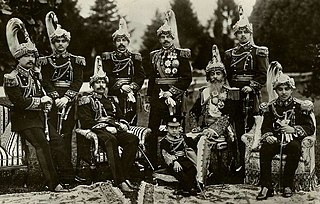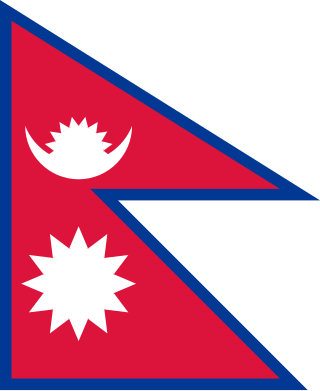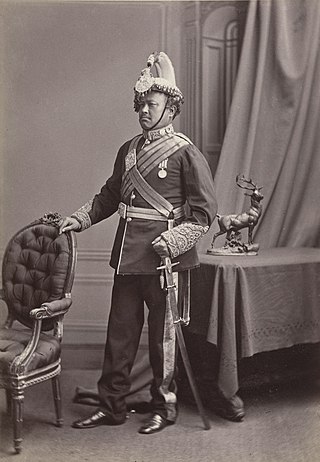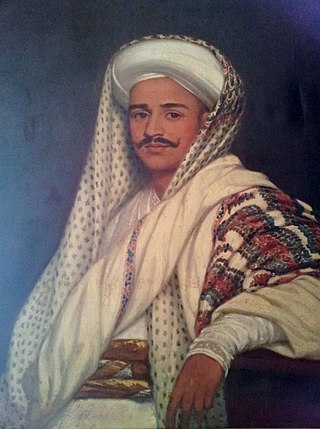Related Research Articles

The Rana dynasty were a Chhetri dynasty that imposed authoritarianism in the Kingdom of Nepal from 1846 until 1951, reducing the Shah monarch to a figurehead and making the Prime Minister and other government positions held by the Ranas hereditary. They are Kshatriya, whose ancestors were descended from the Ranas of Udaipur, Rajasthan, India. The Rana dynasty is historically known for their iron-fisted rule. This changed after the Revolution of 1951 with the promulgation of a new constitution, when power shifted back to the monarchy of King Tribhuvan.

Nepal competed in the Summer Olympic Games for the first time at the 1964 Summer Olympics in Tokyo, Japan.

Ranaudip Singh Bahadur Kunwar Ranaji, KCSI, commonly known as Ranodip Singh Kunwar was the second Prime Minister of Nepal from the Rana dynasty. His style was His Excellency Commanding General Shree Shree Shree Maharaja Sir.

HH Maharajadhiraj Shri Maharaja Mahim Mahendra Maharao Raja Sir Bhim Singh II Bahadur, KCSI was the last ruling Maharaja of the Hada Chauhan dynasty of the Princely State of Kotah from the year 1940 to 1947.

The Government of Nepal is the federal executive authority of Nepal. Prior to the abolition of the Nepali monarchy in 2006, it was officially known as His Majesty's Government.
Thapa Kaji is a large social group of people of Jharra/Pure Chhettri caste in Nepal. Thapas of Uttrakhand And Himanchal State of India are considered as Pahari Rajput. Over a period of time, this community has spread to many parts of the world. The surname originated during the Khas Kingdom in Karnali region during middle age-it referred to a position/post of a warrior. Chhetri is considered a derivative form of the Sanskrit word Kshatriya.

Bal Narsingh Kunwar or Balanarsingh Kanwar posthumously referred as Bal Narsingh Kunwar Rana was a Kaji, military officer and governor in the Kingdom of Nepal.

Ranga Nath Poudyal Atri popularly known as Ranganath Pandit was the Mukhtiyar of Nepal from 1837 December to 1838 August and in 1840 November for about 2–3 weeks. He was the first Brahmin Prime Minister of Nepal.

Kirtiman Singh Basnyat was Mul Kaji of the Royal Court of Nepal between 1794 and his death on 28 September 1801. He was a military commander of the Nepalese Army.

Ranadhoj Thapa or Ranadhwaj Thapa was deputy Kaji to Mukhtiyar of Nepal Bhimsen Thapa.
Amar Singh Thapa, distinguished as Sanukaji Amar Singh Thapa was a Nepalese military commander, courtier, minister and regional administrator. He was born as the youngest son of one of the leading Gorkhali Bharadar Birabhadra Thapa. He led battles against many independent principalities in Nepal and a battle against Tibet. He was a Governor of Palpa and retained the post till his death in 1814.
Bohra, also known as Bohora (बोहोरा) or Bohara (बोहरा), is a Brahmin (bahun) and Chhetri surname of the Khas community of Nepal.
Ganga Bahadur Thapa was a Nepalese long-distance runner. He competed in the marathon at the 1964 Summer Olympics.
Ranajit Pande was Nepalese politician, military personnel and courtier in the Kingdom of Nepal. He was member of the Gora Pande clan of Gorkha. He became Mulkaji of Nepal for a brief period in 1804 A.D.

The Pande family or Pande dynasty was a Rajput-Chhetri political family that directly ruled Nepali administration affairs from the 16th century to 19th century as Mulkaji and Mukhtiyar. This dynasty/family was one of the four noble families to be involved in active politics of Nepal together with Shah dynasty, Basnyat family and Thapa dynasty before rise of Rana dynasty. Pande dynasty is the oldest noble family to hold the title of Kaji. This family was decimated from political power in 1843 CE in the political massacre by Prime Minister Mathabar Singh Thapa as a revenge for his uncle Bhimsen's death in 1839.
The Bhandarkhal massacre was a political massacre that occurred in Bhandarkhal garden of Hanuman Dhoka, Kathmandu in 1806. The chief perpetrator of the massacre was then Kaji Bhimsen Thapa. Bhimsen instigated the massacre as investigation and trial upon the death of then reigning Mukhtiyar and former King Rana Bahadur Shah. It began when Tribhuvan Khawas (Pradhan), a member of Sher Bahadur's faction, was imprisoned on the re-opened charges of conspiracy with the British that led to Knox's mission and finally convicted with a death penalty on the charge of treason. After the implication, Tribhuvan decided to reveal everyone that was involved in the dialogue with the British on his house meeting on the night of 25 April 1806. The confession implicated Sher Bahadur Shah, Rana Bahadur's step-brother and he began to harass his stepbrother. Unable to bear desperation, Sher Bahadur killed Rana Bahadur and triggered the massacre which lasted for two weeks. The number of deaths occurred was ninety-three people.
Krishna Bahadur Kunwar after 1848 CE known as, Krishna Bahadur Kunwar Rana was the Nepalese politician, administrator, military general and minister of state. He served as the acting Prime Minister of Nepal upon the demise of his elder brother Bam Bahadur Kunwar from 25 May 1857 to 28 June 1857. He also served as the Commander-In-Chief of the Nepalese Army between 1857 and 1862.
Sher Bahadur Shah was a Nepalese noble who served as Chautaria from 1794 until his assassination in 1806. He was the son of King Pratapsingh Shah and the 3rd dynasty royal prince of Nepal.
Bidur Bahadur Shah was a Nepalese noble who served as Chautaria under the reign of Rana Bahadur Shah.
References
- ↑ Evans, Hilary; Gjerde, Arild; Heijmans, Jeroen; Mallon, Bill; et al. "Bhim Bahadur Thapa Olympic Results". Olympics at Sports-Reference.com. Sports Reference LLC. Archived from the original on 18 April 2020. Retrieved 3 December 2018.